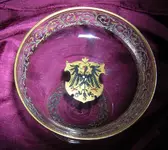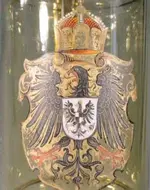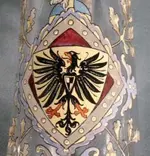Prussia
Before the 16th century Prussia was simply a remote northern German state on the shores of the Baltic Sea. It was flat and marshy with a small, rather poor population. The first important development happened when the ruling family of the state of Brandenburg obtained Prussia as an hereditary duchy in 1525. This was followed in 1618 by the formal unification of Brandenburg-Prussia under the rule of the Hohenzollern family.
Hohenzollerns
This dynasty was one of the most important royal families in Europe. The history of the family dates back to the 11th century and its name is taken from the castle of Burg Hohenzollern, near T?bingen. There were several branches of the dynasty, but the principle one was the ruling house of Brandenburg-Prussia from 1415 until 1918 and it provided the emperors of imperial Germany from 1871 to 1918. One line of the family, Hohenzollern-Sigmaringen, became the royal house of Rumania from 1866 to 1947.
At the end of the 17th century the German states were weak and divided. Only one, Brandenburg-Prussia, had a ruler with a vision of the future and the determination to achieve his ambitions. This was Frederick William, the Great Elector (1640-1688). He completely unified the scattered Hohenzollern possessions by creating a ruthlessly efficient administration. He recruited Dutch engineers to drain the marshes and swamps. He also welcomed French, German and Swiss Protestant refugees from religious persecution. With state aid, these refugees rapidly settled in their new country and helped Frederick William create an economic revolution. Factories were built and a postal system established.
Everyone, nobles and commoners alike, paid taxes to support a small, but efficient, army. In 1675 the Great Elector used this army to challenge Swedish power by marching into Pomerania ( a German state on the southern shores of the Baltic controlled by Sweden) and defeating the Swedes. This victory was a little premature because, in 1678, Sweden's ally, Louis XIV, forced Frederick William to retire from Pomerania. Frederick William, however, was ready to be patient and wait for the next opportunity.
The chance came when the great Elector was succeeded by the Elector Frederick III (1688-1713). He managed to obtain from the Emperor the title of King of Prussia. In 1701 the new king, now titled Frederick I, King of Prussia, established his royal court at K?nigsberg. (During the official ceremony Frederick flew into a rage because his queen took snuff during the service and, each time he took a drink, a nine cannon salute was fired). He was described as being "great in little things", which was meant as criticism. However, his strict control of finance, his creation of a fine secondary school system and his welcoming of persecuted Protestants from all over Europe established a Prussian state which would soon rival Austria as the great German power.





 ?)...and what country?.....that would help in your search....this site listed below can assist you in identification....
?)...and what country?.....that would help in your search....this site listed below can assist you in identification....

 I thought German, but not good at these things. Good luck on your venture, and keep us informed.
I thought German, but not good at these things. Good luck on your venture, and keep us informed.
